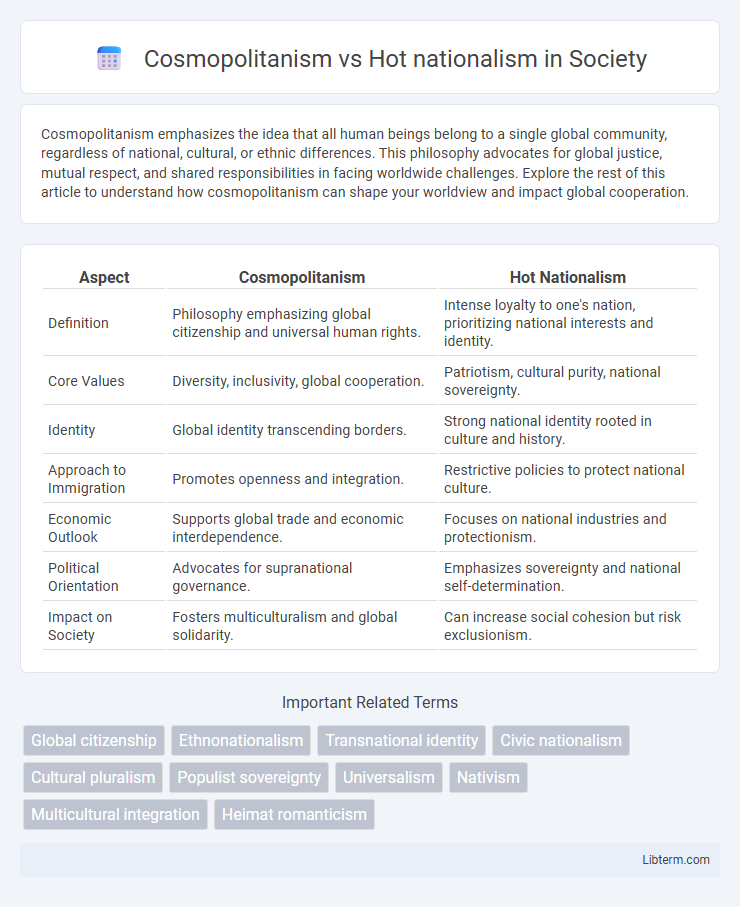Cosmopolitanism emphasizes the idea that all human beings belong to a single global community, regardless of national, cultural, or ethnic differences. This philosophy advocates for global justice, mutual respect, and shared responsibilities in facing worldwide challenges. Explore the rest of this article to understand how cosmopolitanism can shape your worldview and impact global cooperation.
Table of Comparison
| Aspect | Cosmopolitanism | Hot Nationalism |
|---|---|---|
| Definition | Philosophy emphasizing global citizenship and universal human rights. | Intense loyalty to one's nation, prioritizing national interests and identity. |
| Core Values | Diversity, inclusivity, global cooperation. | Patriotism, cultural purity, national sovereignty. |
| Identity | Global identity transcending borders. | Strong national identity rooted in culture and history. |
| Approach to Immigration | Promotes openness and integration. | Restrictive policies to protect national culture. |
| Economic Outlook | Supports global trade and economic interdependence. | Focuses on national industries and protectionism. |
| Political Orientation | Advocates for supranational governance. | Emphasizes sovereignty and national self-determination. |
| Impact on Society | Fosters multiculturalism and global solidarity. | Can increase social cohesion but risk exclusionism. |
Defining Cosmopolitanism and Hot Nationalism
Cosmopolitanism emphasizes global citizenship, advocating for moral obligations that transcend national borders and promote cultural diversity, human rights, and international cooperation. Hot nationalism prioritizes intense patriotism, emphasizing strong national identity, sovereignty, and often a focus on ethnic or cultural homogeneity within the nation-state. Defining these concepts highlights the contrast between inclusive, boundary-crossing values in cosmopolitanism and exclusive, preservation-focused attitudes in hot nationalism.
Historical Roots and Evolution
Cosmopolitanism traces back to ancient Stoic philosophy and Enlightenment ideals, emphasizing global citizenship and universal human rights. Hot nationalism, emerging prominently in the 19th and 20th centuries, prioritizes intense loyalty and cultural unity within a specific nation-state, often fueled by historical conflicts and collective identity. The evolution of cosmopolitanism reflects increasing globalization and multicultural integration, while hot nationalism adapts to contemporary political movements and identity preservation efforts.
Key Philosophical Principles
Cosmopolitanism emphasizes global citizenship, valuing moral universalism and the inherent worth of every individual regardless of national boundaries, rooted in Enlightenment ideals of equality and justice. Hot nationalism prioritizes intense loyalty to one's nation-state, grounding identity and moral obligations in shared history, culture, and sovereignty, often advocating for collective self-determination and protective patriotism. The philosophical tension revolves around universal moral responsibility versus particularistic allegiance, raising debates on the scope of justice and political community.
Globalization and Identity
Cosmopolitanism promotes a global identity that transcends national boundaries, emphasizing interconnectedness and cultural exchange in the era of globalization. Hot nationalism, by contrast, intensifies loyalty to a specific nation-state, often reacting against the perceived threats of globalization to cultural uniqueness and sovereignty. The tension between these perspectives shapes contemporary debates on identity, migration, and global integration.
Social Cohesion: Unity or Division?
Cosmopolitanism fosters social cohesion by promoting inclusive identities and shared global values, encouraging unity across diverse cultures. Hot nationalism, centered on intense loyalty to a specific nation, often intensifies social divisions by emphasizing exclusivity and ethnic or cultural homogeneity. The tension between these ideologies affects social integration, either bridging differences through cooperation or deepening fragmentation through exclusion.
Political Impacts and Policy Shifts
Cosmopolitanism promotes inclusive policies that support global cooperation, migration, and multiculturalism, reshaping political agendas towards internationalism and human rights protections. In contrast, hot nationalism fuels exclusionary policies, emphasizing sovereignty, strict immigration controls, and protectionist trade practices, often leading to political polarization and isolationism. These opposing dynamics influence electoral outcomes, legislative priorities, and diplomatic relations, triggering shifts toward either integrated global governance or intensified state-centric nationalism.
Cultural Exchange vs. Cultural Preservation
Cosmopolitanism promotes cultural exchange by encouraging the blending and sharing of diverse traditions, ideas, and values across global communities, fostering mutual understanding and innovation. Hot nationalism emphasizes cultural preservation by prioritizing the protection of a singular national identity, often resisting external influences to maintain unique customs, languages, and heritage. The tension between cosmopolitan openness and nationalist cultural protection shapes debates on globalization, migration, and cultural policy worldwide.
Cosmopolitanism and Human Rights
Cosmopolitanism advocates for universal human rights and global justice, emphasizing the moral responsibility individuals have beyond national borders. It promotes inclusivity, equality, and respect for cultural diversity while supporting international institutions that protect human dignity worldwide. This approach contrasts sharply with hot nationalism, which prioritizes exclusive loyalty and often undermines global cooperation on human rights issues.
Challenges of Rising Nationalist Sentiment
Rising nationalist sentiment challenges cosmopolitanism by promoting exclusive identity politics that often reject global interconnectedness and multiculturalism. This surge in hot nationalism fuels xenophobia, restricts immigration, and undermines international cooperation, destabilizing diplomatic relations and trade agreements. The tension between promoting national sovereignty and fostering global unity complicates efforts to address transnational issues such as climate change, pandemics, and economic inequality.
The Future: Bridging Differences
Cosmopolitanism advocates for global unity by promoting shared human values and cross-cultural understanding, fostering cooperation beyond national borders. Hot nationalism emphasizes fervent pride and loyalty to one's nation, often prioritizing national sovereignty and cultural distinctiveness. Bridging these differences requires embracing inclusive policies that respect national identities while encouraging dialogue and collaboration on global challenges such as climate change and economic inequality.
Cosmopolitanism Infographic

 libterm.com
libterm.com